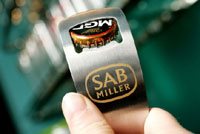Total beverage volume up, emissions to go down - SABMiller

In posting its review of performance for the year to March 2009, SABMiller reported headline earnings per share of 119 US cents against 133 US cents previously, while adjusted earnings per share were 4% lower at 137.5 US cents, due to a significant increase in net finance costs which was partly offset by a lower effective tax rate.
The adjusted earnings per share showed double-digit increases when measured in rand and sterling. On a statutory basis, basic earnings per share of 125.2 US cents were 7% lower, the group said.
Total beverage volumes grew 2% to 260 million hectolitres, with reported lager volumes also rising 2% to 210 million hectolitres including acquisitions in Europe, Africa and Asia.
Adjusted profit before tax of $3,405 million decreased by 6% over the prior year primarily as a result of higher commodity costs, increased finance costs and the impact of the translation of local currency results into US dollars, SABMiller said.
Net cash generated from operations before working capital movements (EBITDA) of $4,164 million was $354 million (8%) lower than last year.
The decrease was due primarily to the reduction in EBITDA from North America following the formation of the MillerCoors joint venture, since EBITDA as defined excludes cash flows from associates and joint ventures, the group said.
South Africa lager volumes declined 2%, while EBITA was down 8% on higher input costs
Meyer Kahn, chairman of SABMiller said: "I am pleased to report another robust performance from your company. We all know that things have been tough this year.
Not only did we face softening consumer demand, we also had to contend with an increase in commodity costs and a strengthening US dollar.
"We continued to invest in the business, with capital expenditure during the year totalling some $2,100 million and acquisitions a further US$300 million.
"Despite this very significant investment, net debt at the year end was lower than the prior year and the group remains financially strong."
Chief executive Graham Mackay said: "While there is little we can do to influence the macro-economic environment at the present time, there is much that remains within our control not least, to keep building our local brands, to develop the beer category and to increase the share of beer within the alcohol market in developing countries.
SABMiller's long experience and inbuilt resilience provide strong grounds for confidence in the testing year we undoubtedly face."
Looking ahead, SABMiller said the group remained confident in its medium-term prospects. "We are taking appropriate short-term mitigating actions in certain countries to reduce costs.
Investment plans have been reviewed and curtailed where necessary in the light of expected economic conditions, but we continue to invest selectively to support growth.
"The group remains in a strong financial position, and we are confident that we will continue to benefit from the strength of our brands and our globally diversified and well-balanced portfolio of businesses," it said.
At 11.32am SABMiller had added R2.21, or 1.34%, to R167.73 on the JSE.
Reducing fuel emissions
The brewer also announced on Friday that it plans to reduce fossil fuel emissions from its brewing processes by 50% per litre of beer produced by 2020.
The group said it aimed to achieve that target through greater energy efficiency and by utilising renewable energy sources including brewing by-products and agricultural waste.
The new target relates to the fossil fuel emissions generated from energy used within SABMiller's on-site operations.
The company added that it was also committed to reducing carbon emissions within its value chain. It pointed to its Colombian business, Bavaria, investing $145 million to implement 'super returnable' bottles, which have a reduced carbon impact.
Mackay said: "Climate change is an issue of growing global concern; with likely impacts on weather patterns, water availability and crop yields our business will feel direct effects".
"Our new strategic approach to reduce fossil fuel gas emissions per unit of product will allow us to contain our emissions by 2020, despite growth in production volume".
This follows our commitment last year to reduce our water consumption by 25% per hectolitre of beer by 2015, a target towards which we are already making progress," he said.
Published courtesy of
























